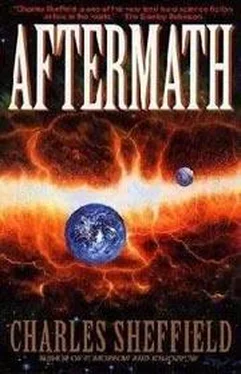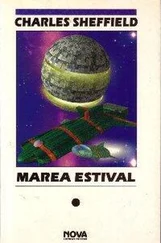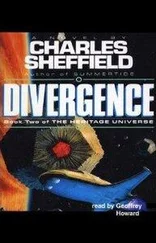And then that was no longer the question. Art knew the truth before he entered the lab. Even in the freezing air, the scent of corruption filled his nostrils. He stepped forward, to where Dana and Seth stood in silence at the open double doors.
The lab had always been messy, but with the organized messiness of a medical research facility. Now it was a chaos of broken glassware, smashed electronic equipment, and overturned furniture. A pitched battle had taken place here, in among the long workbenches.
What had they been fighting over? Probably something as simple as food or fresh water. There were plenty of genome readers, scanning probe microscopes, and gas chromatography units, but the big jars of distilled water on the lab shelves had all vanished.
In any case, the reason for the fight did not much matter. And the outcome had been inevitable. With fists and improvised clubs against guns and knives, the staff of the Institute hadn’t had a chance. It had been a planned attack, too, with assistance from someone on the inside, because the doors and windows of the Institute showed no signs of an earlier break-in.
Seth stepped forward and paced the cluttered space between two of the benches. He stopped halfway along. “Here’s Dr. Mackerras,” he said, softly and without emotion. “And here’s Janina — she was the lab technician who gave me my treatment. I always liked her.” He took two more steps and leaned over a body. “I think this is Dr. Chow, but his name tag’s gone. And half his face has been blown away.”
Dana and Art, without a word, separated and began their own inspection of the space between and around the workbenches.
“Dr. Rothstein,” she said after a few seconds. “And Gil Senta — he was the first person to interview me, when I wanted to join the program. Here’s somebody I don’t recognize — probably from outside, he’s dressed differently. Dr. Lasker is underneath Gil. Looks like she died of gunshot wounds. Three of them, in the head.”
Art seemed to be the lucky one, if that was the right word for it. The aisle along which he walked was a jungle of shattered glass and twisted metal, but he saw no people. Then he turned the corner, and wasn’t lucky after all. Four bodies, ice-cold when he moved them to see their faces, lay tangled together.
“Dr. Taunton is here,” he said. He did his best to keep his voice neutral, as Seth and Dana had done. They would realize, without histrionics or explanations on his part, that his words spelled doom for all of them. Dr. Taunton was the third member of the triumvirate. The three leaders of the telomod treatment group were all dead, and telomod therapy still had a big experimental component. Even if living members of the Institute’s support staff could be found, they lacked the knowledge needed to adapt treatments to changing circumstances.
Art kept walking the aisles. The damage to equipment, when you looked at it more closely, was not so bad as at first sight. Given good technicians — and electrical power, and spare parts, and working microchips — it might be made to work again. None of those things was available; but nothing was so complete a disaster as the loss of the top brains of the program.
Seth Parsigian had given up on his own inspection. He climbed on top of one of the workbenches and sat cross-legged amid the mess. His arms were folded, and he hunched forward with his head bowed.
“All right,” he said as Dana and Art walked over to join him. “We got us a setback. Question is, where do we go from here?”
“They’re dead,” Dana said. She clutched Art’s arm, hard. “All of them. Even if some technicians got away, they don’t know enough to help.”
“Maybe in some other city, on the West Coast . . .” Art said. But as he spoke he knew he was offering false hope. The telomod treatment group had drawn its members from all over the country. There were even a couple from Asia and Europe. Why would they come all the way to the Institute if the same thing could be found anywhere?
Seth picked up a long splinter of glass and fingered its edge. “No, no. It’s hard enough to travel locally. We’d be chasing rainbows lookin’ for another group someplace. Anyway, we don’t have time for that.”
Finally he raised his head, to stare at the other two. “We’re down to long shots. How much risk are you willing to take?”
“Anything,". Dana said at once. Art nodded agreement, but he was thinking: Down to long shots? Wasn’t this trip to the Institute already a long shot?
“Any amount of risk,” he said. “If I knew what to do. Do you have something in mind?”
“Oh, yes.” Seth acted amused — there was a smile on his face, no matter how little it seemed to belong there. “How long since you joined the telomod program?”
“Nearly three years,” Art said, and Dana added, “Closer to four for me — my anniversary is next month.”
“That right? Me, I’m one of the old-timers — in the program near five years, started when they didn’t hardly know what they was doin’. Got scars to prove it. And I got a lot more years to go, touch wood.” Seth slapped the black bench top, which was hardened plastic. “I’m not about to give up.”
Dana glanced at Art, a look that said, Is Seth losing it? What’s he talking about?
“Back then,” Seth went on, “Lasker and Taunton were already involved. Dr. Chow arrived four months after I had my first shot of telomerase inhibitor, two months after my tumors started shrinking and I began to think I might have some kind of chance. Old Chinaman Chow was a new boy compared to me. And ’cause I was one of the first, I heard some of the old history, back before my time. See, Lasker and Taunton knew what they were doing, but the techies round the labs told me they weren’t the brains behind the project. The real genius, the spark who started things going here, he was somebody else.”
“I never heard of anybody like that,” Art said slowly. “And I think I’ve met most people around the Institute.”
“Yeah. See, he was never at the Institute. He was a big-brain research scientist, doing his own thing at some ol’ college. He never had a hands-on role in the application of telomod therapy, but he knew more about the basics than anybody. And I’d bet money — if money meant anything now — that you did hear of him.”
“I’m sure I didn’t.”
“Me neither,” Dana added.
“Ah. Neither of you ever heard of a man called Guest?”
“Never,” Dana said, while Art stood staring.
“ Oliver Guest? Doctor Oliver Guest?” Parsigian laughed aloud at the expressions of understanding and disbelief on their faces. “Ah, now you’re gettin’ there.”
“Grisly Guest,” Dana said.
“The child murderer,” added Art.
“One and the same.” Seth nodded casually. “From around these parts, too. Local boy makes good.”
“But he worked on clone research, not telomod therapy,” Dana objected. “The clone king. He knew more about cloning than anybody. At least, that’s what they reported during the trial.”
“He did telomods, too. A real broad-gauge maniac, old Oliver. You didn’t hear about him from the telomod group, because he wasn’t somebody the project was goin’ to advertise when it went lookin’ for grants and experimental subjects. His name was a no-no at the Institute. But I checked him out after I heard. He started the whole ball rolling for the telomod treatment. Without him our program wouldn’t exist. Then he got a bit sloppy, and they nabbed him for his after-hours hobby.”
“He was found guilty,” Art said. “Fifteen children—”
“ — eighteen, by the time they was all done. Found guilty, and iced down for six hundred years. He was under forty when it happened. Which means that he ought to be alive now, in that Q-5 judicial sleep place down south of here where they put the weirdo cases. Wake him up, and he can treat us. If we can get to where he is, through all the shit that’s flyin’ around since Supernova Alpha. And if he’s alive, I don’t know how quick they spoil when they’re not bein’ looked after. And if we can control him, so he don’t add us to his little list. That one may be the toughest — I reckon he’s one smart and crazy son of a bitch.”
Читать дальше












